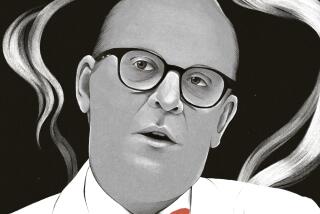THE DEATH OF ELIOT NESS WAS EXAGGERATED
- Share via
Al Capone couldn’t kill him. Frank Nitti couldn’t intimidate him. Bugs Moran couldn’t lay a finger on him. It took a movie critic to bring down Eliot Ness, and I didn’t even mean to.
I felled him in a review of Brian De Palma’s “The Untouchables.” I asserted that Ness was a suicide--when the poor fellow was a victim of a heart attack in Pennsylvania in 1957. Then, slipping on my banana, Howard Rosenberg repeated my mortifying error in his column comparing De Palma’s movie with TV’s great gray eminence. That picked up the tempo briskly: Rosenberg is syndicated .
Thus does a bum deed travel like lightning. It was days before I learned of my gaffe, by which time “everyone” now “knew” that Eliot Ness killed himself. Try to tell people the facts and they waved me off; they’d seen it in print!
Before I know it, the “eyewitness” to the “suicide” will be talking to Geraldo Rivera and there’ll be no end to it.
A few purists checked my jaw-dropper: Frank Swertlow at the Daily News; Julie Solomon at the Wall Street Journal; Marilyn Beck, dealing with disgruntled rumbles from Robert Stack (see below).
In other corners, the thesis of the hero with the fatal flaw was moving faster than a brush fire.
Where did the wretched item come from anyway? Well, I saw “The Untouchables” with X, a companion who is a fund of information about the Capone era. The name of the man at the receiving end of Capone’s baseball bat? Joseph (Hop Toad) Giunta. Was that how Frank Nitti really died? Naaah. He killed himself in 1944, facing a sentence for tax evasion--not in hand-to-hand combat with Eliot on the rooftop.
The toll on G-Men was fierce, X expanded. Did I know that Melvin Purvis, the G-man who got Dillinger, later killed himself with Dillinger’s own gun? And that Eliot Ness was a suicide too? I checked--every detail but the crucial one. And each of the other ones was exactly right.
Librarians said there’d been a run on Ness’ own book, “The Untouchables,” written with Oscar Fraley. It was out. Encyclopedias of crime find Capone a lot more thrilling than Ness; he’s the invisible man. Even the New York Times didn’t carry his obituary.
Alone and unimpeded by the facts, I did in Eliot Ness.
Is there a moral? Perhaps only irony--that in death as in his life, the real facts about a good man were less interesting to the world than a lurid fiction.
More to Read
Only good movies
Get the Indie Focus newsletter, Mark Olsen's weekly guide to the world of cinema.
You may occasionally receive promotional content from the Los Angeles Times.








